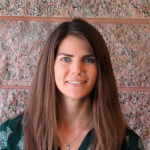
Julianah is the Environmental Programs Superintendent at City of Frisco, where she’s been for the past 7 years. She has her Bachelor’s from University of Oregon (2013) in Environmental Studies. At College of Charleston she obtained her Masters in Public Administration with an emphasis on Environmental Policy and Regulation and did her thesis on the environmental justice of mining operations examining mines located in tribal land versus those outside of tribal land in the United States. Her focus on resource consumption continued at her work at City of Frisco in the solid waste and recycling division. During her work here she pivoted her focus to address wasted food. Inspiration spurring from visits to the schools to assist in recycling in the cafeteria brought up the extent of food waste we contribute to. To address this issue, she reached out to leaders in the field and was encouraged to apply for a fellowship and earn a second Masters at Johns Hopkins School of Public Health as a Bloomberg American Health Fellow. With this, she created and the City of Frisco adopted a Food Waste Reduction Framework to the Solid Waste Management Plan.
SESSIONS
May the Fork be With You: municipal efforts to support reducing residential wasted food
Wasted food decomposing in landfills emits a short-lived climate pollutant, methane. The residential sector responsible for nearly 40% of the countries wasted food and the highest portion sent to landfills. This is also the most difficult sector to change as it requires wide-spread individual behavior change. This program provides tools to reduce food waste and address the cognitive dissonance.Why the residential sector needs to be targeted and what one method is to get stronger public buy-in to the issue and support for addressing it.
Learning Objectives
- Understand the generators and end markets for the food waste streams and where there are opportunities for mitigation.
- Learn the challenges to addressing the residential sector, what can be done to overcome these.
- Understand the benefits to addressing the residential sector and how to capitalize on that.
Participant Outcomes
- Where in their community has the biggest possibility to reduce wasted food going to landfill.
- How to approach the issue of food waste with residents.
- How to get residents to be your biggest champions for cultivating new social norms.

